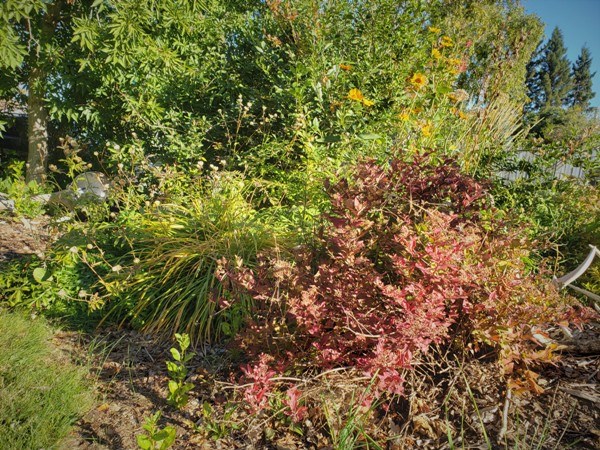Autumn is a lovely time of year. The air has a crispness to it and the colours are usually spectacular. Our chores in the garden change a little bit as freezing temperatures convince hardy plants, trees and shrubs to rest as winter approaches.
Most of us that live in places that have seasonal change have planned mixed borders. These are areas in the garden that are not devoted to just annuals or perennials. They grace us with beauty for as long as possible during the growing season with a great variety of colours, textures and shapes. A mixed border contains trees, shrubs, perennials, vines, bulbs and even annuals. It is for sure the most attractive and best option for any garden with four seasons.
Perennials and annuals that are not late bloomers are finished for the year and those that little winter aesthetic value can be cut back anytime. Remember that seed heads, grasses and other perennials can be quite attractive during those long winter months so if there is value to leaving them stand, they can easily be cut back in early spring. Another consideration is whether or not you wish to trap a little bit more snow in your border. Anything vertical will help to keep the snow on your beds providing much needed moisture for early next spring.
Roses might warrant some extra protection for the winter. Hardy shrub roses that are established don’t really need any extra help but if you like to grow tea roses or other roses that are less hardy here, it is good to prepare those for the upcoming winter. Those tender grafted roses need to be mulched over the crown with soil, mulch or other insulating material. A few inches of mulch can raise the temperature as much as 5 or 10 C. One word of caution, if you have a rodent problem, mulch once the ground has frozen. In the spring, remove the mulch as early as possible once the snow melts and very low temperatures have ceased to be a threat.
One important chore for any newly established woody ornamentals and perennials is to give them one last big drink so they go into winter surrounded by damp soil. Watering in anything tender or newly planted will keep that soil temperature more constant thus keeping them happier while they rest. Once this chore is done and we are unlikely to have any warmer days, it is a good time to drain those hoses and put them away for the winter.
Decorative clay pots, concrete ornaments and wooden furniture should be protected from the ravages of our long winter. Some items can easily be tucked into a corner and covered with tarps to protect them from the sun and keep off the snow and rain. For clay pots that tend to crack over the winter, I tuck them here and there in sheltered areas empty and upside down.
If you are expanding any planting areas, fall just happens to be the best time to get those areas prepared for spring planting. Remove any turf and those pesky perennial weeds and then amend the soil. The freeze, thaw cycles help to break down soils so come spring you are ready to plant.
Hopefully you have thought about adding some early spring colour to your garden. Before the ground freezes, set in your spring flowering bulbs allowing them time to root prior to winter. They need the cold temperatures to initiate the bloom that is always enjoyed after a long winter. Enjoy the last days of mild temperatures prior to the big freeze.
‑‑ Hanbidge is the Lead Horticulturist with Orchid Horticulture. Find us at ; by phone at 306-931-4769; by email at [email protected]; on facebook @orchidhort and on instagram at #orchidhort.




